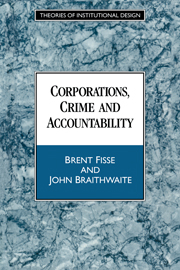Book contents
- Frontmatter
- Contents
- Preface
- Abbreviations
- 1 Crime, Responsibility and Corporate Society
- 2 Individualism
- 3 Enterprise Liability
- 4 Organisation Theory Perspectives
- 5 Making the Buck Stop
- 6 Assessing the Accountability Model
- 7 The Possibility of Responsibility for Corporate Crime
- Bibliography of Cited Works
- Index
5 - Making the Buck Stop
Published online by Cambridge University Press: 11 March 2010
- Frontmatter
- Contents
- Preface
- Abbreviations
- 1 Crime, Responsibility and Corporate Society
- 2 Individualism
- 3 Enterprise Liability
- 4 Organisation Theory Perspectives
- 5 Making the Buck Stop
- 6 Assessing the Accountability Model
- 7 The Possibility of Responsibility for Corporate Crime
- Bibliography of Cited Works
- Index
Summary
Responsibility for Corporate Crime in Modern Society
Responsibility, as we saw in Chapter 2, is a device for achieving social control that does not depend on metaphysical or intrinsic qualities of ‘moral persons’ or human agents. Responsibility for corporate crime may thus be corporate as well as individual. Corporate responsibility may be based on corporate intentionality, in the sense of corporate policy, or corporate negligence, in the sense of an inexcusable failure to meet the standard of conduct expected of a corporation in the position of the defendant.
It was also shown in Chapter 2 that the theory of deterrent punishment is not confined to individual actors but is consistent with corporate criminal liability. Several reasons were given for this extension of deterrence theory:
(1) Deterrence does not imply that punishment must be directed at individual actors.
(2) Uncertainty as to the nature of corporate action does not have the policy implication that deterrent punishment should be limited to individual actors but is entirely consistent with sanctioning strategies that focus on corporate as well as individual actors.
(3) Deterrence and organisational reform are complementary rather than mutually exclusive means of controlling corporate conduct.
(4) The deterrent capacity of individual criminal liability is limited by various factors, namely: enforcement overload; opacity of internal lines of corporate accountability; expendability of individuals within organisations; corporate separation of those responsible for the commission of past offences from those responsible for the prevention of future offences; and corporate safe-harbouring of individual suspects.
Moreover, we argued in Chapter 2 that retribution is not necessarily inconsistent with corporate criminal liability; the more plausible retributive theories are capable of extension to corporate entities.
- Type
- Chapter
- Information
- Corporations, Crime and Accountability , pp. 133 - 157Publisher: Cambridge University PressPrint publication year: 1994



